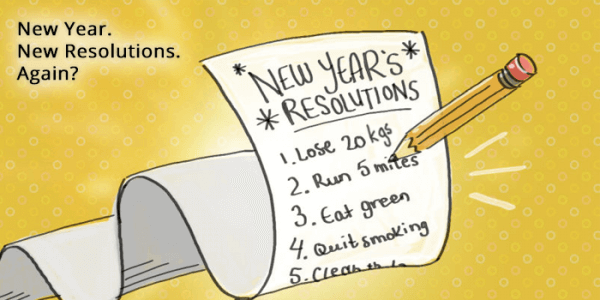Every year, when the new year rolls around, half the world – or at least the ones who are aware of such customs – make one or more resolutions.
To change lifestyles.
To be kinder to others.
To be less stressed.
To achieve a better work-life balance.
To take up new hobbies.
Etc., etc., etc.
That’s on the 1st of January. Even on the 2nd! Sometimes, till the end of the first week of January…than, somehow, the resolutions quietly slip away – to make a return the next year. And every year thereafter. But, it doesn’t have to be like that.
We can all make one important resolution, or more, and stick to them through the whole year. The trick is to make resolutions that are reasonable, rational, achievable… in incremental stages. Something you can follow through right through the year, year after year. Little improvements, small changes – that will impact your life (and those around you) positively and helpfully. So, let’s get started..
From eating healthier to getting more sleep, generally the more popular New Year resolutions aim to achieve a healthier lifestyle. Like losing weight. Right away. Not being able to stick to this, quite impossible goal, is demoralising and results in jettisoning this resolution (and others!) before February even comes around.
According to B.J. Fogg (psychologist and researcher, Stanford University, USA), behavioural changes occur “providing you keep it small and identify easy-win behaviours—“tiny habits”—that will put you on the path to that goal.” Instead of setting major goals, such as losing weight for the whole year, at one go, set minor weight loss goals for each month. Achieving these will boost your morale and keep you going through the year.
To start with, change your eating habits!
Throw out all the sugary snacks and salty, over-processed junk food. Brian Wansink (professor/director – Cornell University Food and Brand Lab, author of Mindless Eating: Why We Eat More Than We Think and Marketing Nutrition), says: “You see food and you eat it just because it’s there”. He also suggests controlling portion sizes.
Pune-based nutritionist Vrushali Brahma says (Livemint December, 2017) that, “A calorie deficit can help you reduce and/or maintain weight, but it’s important to ensure that you are getting a balance of nutrients as well to prevent muscle loss.” He recommends adding more fish, whole grains, fish nuts, seeds and olive oil to your daily diet as all these food build muscle mass and not fat.
Exercise: When it suits you, the way it suits you
“The best time to exercise is when it’s right for you,” says Deepak Rawat, national fitness manager of the gym chain Fitness First India, as quoted in Livemint, December 2017. Pick the time of day that you prefer and stick to it. This way, exercising will become a habit. Opt for a form of exercising that suits you, your lifestyle and the type of person you are.
Get adequate sleep, and maintain a bedtime routine
The more anxious and stressed you are, the less sleep you get. And soon, you suffer from a sleep deficit. This often leads to obesity, heart disease, hypertension, etc. Restoring mental well-being and being physically rejuvenated, begins with putting your sleep patterns in order. To get the right amount of sleep is to develop what Arianna Huffington (founder of The Huffington Post, author of The Sleep Revolution), calls the “bedtime routine” of ditching your devices, having a hot bath, getting dressed for sleep, maybe having a warm drink and reading an actual book.
Get an interesting and healthy hobby
A hobby can help relieve stress, develop new skills and grow your social circle. This year join a cooking class, start swimming sessions, join a hiking group, go rock climbing or cycling. Do something that engrosses you – painting, embroidery, cooking, music. Focusing on a hobby will improve the quality of your life and leave you refreshed mentally and emotionally.
Unplug. Unwind. Take a break…from technology!
To quote motivational speaker and author Mike Robbins (The Importance of Unplugging, Huffington Post), “What if we unplugged more often? What if we gave ourselves permission to disconnect from technology and the “important” world of uber-communication? While for some of us this is easier than others, most of us could benefit from a little more unplugging and a little less emailing/texting/web or channel surfing in our lives.”
Mr. Robbins goes on to say that, “…unplugging may not always be easy…but it’s crucial to our success and well-being in life. When we’re able to disconnect ourselves, we can regain some of the passion, energy, creativity, and perspective that often gets diminished or lost when we allow ourselves to get sucked into our phones, computers, TVs and other devices.”
Very good advice that all of us would benefit from…
Good deeds benefit the receiver…and the giver!
Many of us feel good just helping others out. It can be monetarily, or by doing someone a small favour or helping out with a few chores.. “Altruistic behaviour triggers the brain’s reward circuitry— the ‘feel-good’ chemicals like dopamine and endorphins, and perhaps even a morphine-like chemical the body naturally produces,” says Gregory L. Fricchione, (Associate Chief of Psychiatry, Massachusetts General Hospital; author of The Heart-Mind Connection).
So, for this new year make your resolutions but keep in mind that they don’t have to be big and ambitious and difficult to maintain through the year. That way, you won’t end up disappointing yourself – and, indeed, you end up impressing people with your positive attitude and focus on making key changes that will improve your health, lifestyle and attitude to the people around you and your environment.
[“source=michiganross”]

